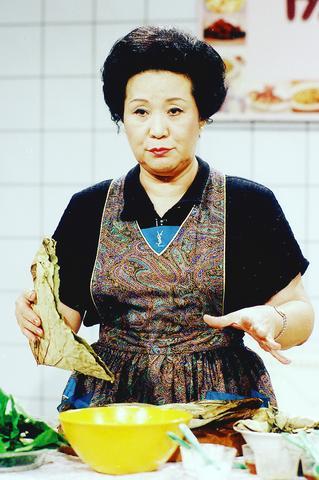Legendary chef Fu Pei-mei (傅培梅) died of pancreatic cancer at the Veterans General Hospital Taipei yesterday at the age of 73.
According to hospital sources, Fu had been fighting liver cancer, and later pancreatic cancer, for seven years. Thanks to her open-minded and optimistic attitude, she seldom complained about her diseases, a family member said.

TAIPEI TIMES FILE PHOTO
Despite her disease, the family member said, Fu took great delight in traveling abroad.
"Travel helped her forget her debilitating illness," he added.
Fu wrote many cookbooks, teaching homemakers cooking skills, recipes and the fun of family cooking. She is reputed to be the first Chinese person to gain fame by writing cookbooks, and her works were once considered vital for a bride's dowry.
Fu used to be the most popular television cooking show host in the country. Starting in 1962, she hosted many weekly culinary programs at Taiwan Television Enterprise (TTV) for almost 40 years, introducing more than 4,000 different Chinese dishes. The programs have been exported to the US, Japan, the Philippines and other Southeast Asian countries.
Born in Dalian in northeastern China during the era of Japanese colonial rule, Fu spoke fluent Japanese, and many Japanese expatriates in Taiwan liked to study Chinese cuisine with her. Japan's public TV channel NHK once invited her to host Chinese cooking programs.
During the heyday of her career -- from the 1970s to the 1990s -- Fu helped promote Taiwan's international presence, as she was often invited to demonstrate Chinese culinary art and skills in various countries.
Fu also ran a cooking class that attracted many housewives and brides-to-be. She closed the class some 10 years ago because of family financial disputes, retired, and was seldom seen in public.
She moved to Taiwan at the age of 19 after the communists took control of China, first working at a trading company and appearing in TV commercials promoting electric home appliances. She began to learn how to cook only after she married.
Fu is survived by two daughters and a son. One of her daughters and her daughter-in-law are also versed in culinary skills. Despite this family background, Fu never ran a restaurant.

The Grand Hotel Taipei on Saturday confirmed that its information system had been illegally accessed and expressed its deepest apologies for the concern it has caused its customers, adding that the issue is being investigated by the Ministry of Justice Investigation Bureau. The hotel said that on Tuesday last week, it had discovered an external illegal intrusion into its information system. An initial digital forensic investigation confirmed that parts of the system had been accessed, it said, adding that the possibility that some customer data were stolen and leaked could not be ruled out. The actual scope and content of the affected data

‘LIKE-MINDED PARTNER’: Tako van Popta said it would be inappropriate to delay signing the deal with Taiwan because of China, adding he would promote the issue Canadian senators have stressed Taiwan’s importance for international trade and expressed enthusiasm for ensuring the Taiwan-Canada trade cooperation framework agreement is implemented this year. Representative to Canada Harry Tseng (曾厚仁) in an interview with the Central News Agency (CNA) said he was increasingly uneasy about Ottawa’s delays in signing the agreement, especially as Ottawa has warmed toward Beijing. There are “no negotiations left. Not only [is it] initialed, we have three versions of the text ready: English, French and Mandarin,” Tseng said. “That tells you how close we are to the final signature.” Tseng said that he hoped Canadian Prime Minister Mark Carney

President William Lai (賴清德) yesterday bestowed one of Taiwan’s highest honors on Saint Vincent and the Grenadines (SVG) Ambassador Andrea Clare Bowman in recognition of her contributions to bilateral ties. “By conferring the Order of Brilliant Star with Grand Cordon on Ambassador Bowman today, I want to sincerely thank her, on behalf of the Taiwanese people, for her outstanding contribution to deepening diplomatic ties between Taiwan and SVG,” Lai said at a ceremony held at the Presidential Office in Taipei. He noted that Bowman became SVG’s first ambassador to Taiwan in 2019 and

A man walks past elementary school artworks at the Taipei Lantern Festival in Ximen District yesterday, the first day of the event. The festival is to run from 5pm to 10pm through March 15.